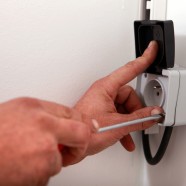5 Tips for Installing a New Power Outlet in Your Home
As your family grows, along with your collection of electronic gear, your need for power will increase every year. You might rely on extension cords or power strips temporarily, but these can be a fire hazard if used for more than just a short time. One of the best methods of electrical protection is to increase the number of outlets in each room. Once you’ve filled up all the outlets and still have a need to plug in more items, it’s time to add a new power outlet in your home.
Read MoreUnderstanding the Electrical Components of Building a Custom Home
When planning your dream home you’ll probably draw up a portfolio showing new bedrooms, a dedicated outdoor kitchen, or even a fully finished apartment in the basement. Custom homes are exactly what you want them to be, with virtually no rules about what to include. The electrical components of your house plan might seem like the boring part of the project, but new construction electrical details determine how you’ll enjoy your new home throughout the year.
Backup Power
Power outages are a fact of life in southern Florida, between tropical storms, lightning strikes, and aging infrastructures. One of the smartest additions you can make to your custom home plans is elements for a backup power supply and protection from blackout damage. Sudden power outages can endanger computers and other delicate electronics, while prolonged blackouts can cause dangerous heat in the summer and loss of frozen food throughout the year. Some of the additions you may add to your plan are:
- A backup generator. If you’ll only need to power a refrigerator, air conditioner, and some lights, a portable generator may be all you need. For larger power needs such as medical machines and whole-house convenience, this is the time to build in a permanent backup generator.
- Dedicated circuits. With the computers in the house on a separate line, they’re less likely to be damaged from storm-related surges when the power goes out, and also when it comes back on.
- Surge suppressors are good for temporary power outages, preventing large surges of electricity from burning out delicate components.
A high-end circuit breaker is necessary for electronics safety, as are emergency lights for outdoor use during power outages.
Wiring New Construction Electrical Projects
The best time to put wiring into a home is before the walls have been built. You might be thinking of installing cable to multiple rooms in the house, but a fiber optic system will provide lightning fast data for not much more money. As a bonus, fiber optics keep working when the electricity goes out, unlike ordinary cable.
If you work at home, you may want to consider building an ethernet cable into the office or spare bedroom. The wiring for a computer network is also a good idea, even if you don’t think you’ll use it right away. It’s always harder to install residential electrical systems after the fact, and it will sit in the wall, passive, until you decide to start creating the network.
Entertainment
If you’re a movie buff, love your stereo equipment, or you have children, a dedicated entertainment room can be a serious choice. Gather all your equipment into one room that’s equipped with datacomm lines, extra electrical outlets for multiple pieces of equipment, lighting with dimmer switches, and even dedicated outlets for a small refrigerator and popcorn maker. New construction electrical systems don’t have to all be about technical details; sometimes they’re just about making your daily life better.
Lightning Protection
Lightning is a fact of life in Florida, the state that gets more lightning strikes than any other in the country. The odds are good that lightning is going to strike somewhere near your house sometime in the future. Installing lightning rods, or air terminals as they’re called today, is the best way to prevent fire and physical damage to your home when it happens. Today’s lightning protection is so small and subtle you probably won’t notice it when you see it, but it packs a large amount of protection in that little footprint. Most custom homes include elaborate landscaping features, and your new construction electrical contractor can add copper lighting diverter lines connecting the largest trees to the ground, leading dangerous lightning from your treetops to a safe spot away from your home.
Read MoreWhy You Need a Generator Maintenance Agreement
Between hurricanes, lightning strikes and tropical storms, power outages are always a worry in south Florida. Losing power is a concern for almost everyone in the area, but it can be a greater problem for some than for others. If you own a business or need electrical power for medical equipment, keeping the power on is crucial for your well-being. Installing a backup generator is the smart thing to do, but you can’t just put it in and forget about it until the next storm. Generator maintenance is something that has to be done on a regular basis if you want your power to stay on in an emergency.
What is Generator Maintenance?
Like a car or any other complicated piece of machinery, generators need servicing every now and again. Without this care metal might be worn or rusted, fuel can leak or get fouled, and the generator might not work when it’s most needed.
Among the tasks needed on a regular basis are:
- Cleaning the air filter
- Changing the oil
- Changing the spark plugs
- Sweeping off the outside intake vents
- Topping off fuel tanks
Finding a Contractor
The electrical contractor who installed your backup generator will probably be able to offer you a generator maintenance agreement. He’s the best choice to work with, because he’ll be intimately familiar with your particular generator brand and the way it was installed in your building. If your contractor doesn’t offer maintenance agreements, ask trusted friends for recommendations. Older companies may be a better choice, simply because a multi-year maintenance agreement counts on the reliability of the contractor. The bottom line is finding someone you trust to come back season after season.
If you’ve recently renovated your home or business, or you’re in the process of planning and creating a new building, your electrical contractor will probably offer you an electrical service contract. This includes monitoring all the electrical equipment in the building, from wiring to lighting. You can add generator maintenance to the service contract. It will be a simple matter for the contractor to check and maintain one more piece of equipment if he’s in your home or business, anyway.
Advantages of a Maintenance Agreement
You’ve got a busy life and, if you’re like most people, you have to prioritize the things in your life that take up your time. Backup generator maintenance may not even be on your weekly radar, much less high on the list of jobs you need to get done. If it’s not done on a regular, timely schedule, though, the odds are that one day, when you need it most, your power is going to go off and the generator won’t come on to replace it. A contractor who comes out once or twice a year makes sure your generator is in great shape and ready for any outage that might happen. You won’t have to remember to do it, and it won’t take hours out of your busy afternoons.
If you have medical issues that require a constant source of electricity or if you run a business in south Florida, having a generator maintenance agreement can pay for itself after one blackout. The peace of mind you’ll have knowing a professional has maintained your machine can be more valuable than the cost of any contract.
Read MoreEnergy Conservation Tips for Your South Florida Business
Going green may be trendy, but it’s also one of the best ways to lower energy costs for your south Florida business. The heat and humidity may mean that your air conditioning has to run all day long, but other energy conservation methods can make a big dent in the money you have to pay out at the end of the month.
Your Building
The environment in and around your building can have a big effect on how much energy you use each day. In south Florida, the biggest challenge is keeping the interior cool and less humid. The air conditioner is one of the most expensive appliances you can use, so anything you can do to reduce the amount of time it’s running will save you money.
Keep the hot sun from coming inside during the warmest parts of the day. This usually means covering the windows in some way. Window film darkens the glass and prevents the sun to heat the interior. It works exactly like shaded glass in a car, stopping the interior from heating up in the hot sun.
Landscaping can be a green addition to your property in more ways than one. Planting trees or tall shrubs in front of windows can shade the windows from the sun during the summer. Use evergreen trees or shrubs instead of deciduous types, since even the winter can be hot and humid during most of the year in south Florida. The landscaping can increase your building’s value as well as helping with energy conservation.
Your HVAC System
A system in good running condition is always less expensive to use, since it doesn’t have to work as hard to get the same results. Keep your HVAC system in great running order by getting a tuneup done early each spring. Create a maintenance agreement with your local contractor so that, in addition to the first-of-the-year tuneup, he’ll also maintain the system on regular visits throughout the year.
Change the filters in your system yourself. If you’re not sure where the filter is, your contractor can show you. Changing the filter is usually a matter of sliding one filter out and sliding a new one in place, which takes just a few seconds to finish. Since filters only cost a few dollars, this may be the most cost-effective step you can take in terms of energy conservation.
A New Business
If you’re designing and planning a new business, you have the advantage of using green building methods from the start. You’ll be able to keep energy costs low by adding conservation goals into your project and adding low-energy products in every part of the business.
Lighting is one of the biggest users of electrical power, and the wrong kind of lighting can be the biggest waste of energy in your business. Newer LED lighting can save significant amounts of power over the year. Not just for desk lamps, you can use LED bulbs in every part of your lighting scheme.
- LED lights in parking lots give a more even coverage over the entire lot
- Task lighting over work desks give more light while using less energy
- Landscape lighting can be a design as well as safety feature, and can run on pennies a day
Choose the equipment in your new business with an eye toward energy conservation. Pick laptops over desktop computers. Look for an EnergyStar rating for kitchen appliances. Add power strips so you can turn off banks of appliances with one flick of a switch. Build fans into the ceiling to reduce the amount of air conditioning needed. Add windows with tinted glass, and reduce the size of the windows in the building.
Need more information on how to keep your business premises cool in summer? Contact us now.
Read MoreGet Money Back from Tax for Installing a Home Standby Generator
Florida is known as the lightning capital of the country, and between lightning, tropical storms, hurricanes and accidents, power outages are a frequent fact of life. If it’s short-lived it may be just an inconvenience, but if your health or business rely on a steady source of power, even the briefest outage can be a severe problem. The best way to ensure you have a steady source of power is to install a home standby generator.
In addition to the obvious advantages of having a reliable power source, you can also use some of the cost of a generator as a deduction on your federal income tax. With three different ways to take advantage of the tax code, it’s likely that you can find at least one way to deduct a portion of the costs of installing a home standby generator.
Capital Gains Tax Credits
As with all the advice in this post, check with a tax attorney or accountant to determine your individual tax liability and the ability to use any credits. If you sell a home and purchase a new one within a certain amount of time, you’ll avoid paying a capital gains tax on the sale of your old home. If you’ve done this more than once, however, you may still owe taxes on the capital gains. Selling a home and not buying another one will automatically cause you to be liable for the taxes, but if you’ve installed a whole house backup generator, you may be able to take a capital gains tax credit, reducing your tax bill at the end of the year.
Energy Tax Credits
The federal government subsidizes renewable energy such as wind and water, but many states will give you an energy tax credit if you install a natural gas, whole-house generator. This is because natural gas is a greener fuel, creating less of a carbon footprint. If you opt for a home standby generator that has the ability to run on biofuel such as that created in landfills, you may be eligible for an additional tax credit or even an alternate fuel grant. Your state energy department will have all the information needed available for you and your accountant.
Medical Needs
If your doctor will verify that a continuous supply of power is crucial for your health and well being, you may be eligible for a tax credit for your generator. You’ll need to itemize your deductions at the end of the tax year. Once itemized, every bit of legitimate medical expenses over the legal limit, which is 7 to 10 percent of your gross income, is deductible. The power has to be a crucial factor for keeping either you or a family member alive and healthy, and you’ll have to include a certified letter from a medical doctor detailing the medical condition and swearing that a constant power supply is a medical necessity. Depending on your income, you may be able to write off some or even all of the expense of having a backup generator installed in your home.
Natural Disasters
While not a tax deduction, FEMA does offer reimbursements for electrical generators in case of a national or local emergency. The program starts when your governor declares a state of emergency, and it will continue until the power comes back on. Have your whole house backup system installed or buy a portable generator during that time, and you can be eligible for getting the entire cost of the generator reimbursed.
There are multiple ways to reduce the cost of installing a home standby generator, but the benefit of having reliable power is priceless. Call us today to discuss how we can help meet your needs while saving you money.
Read More





Recent Comments